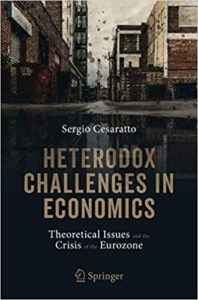 Heterodox Challenges in Economics. Theoretical Issues and the Crisis of the Eurozone
Heterodox Challenges in Economics. Theoretical Issues and the Crisis of the Eurozone
Sergio Cesaratto
Springer, Cham, 2020
https://doi.org/10.1007/978-3-030-54448-5
Print ISBN 978-3-030-54447-8
Book’s page in the Publisher’s website
This book discloses the economic foundations of European fiscal and monetary policies by introducing readers to an array of alternative approaches in economics. It presents various heterodox theories put forward by classical economists, Marx, Sraffa and Keynes, as a coherent challenge to neo-classical theory. The book underscores and critically assesses the analytical inconsistencies of European economic policy and the conservative nature of the current European governance. In this light, it examines the political obstacles to proposals to reform the European monetary union, as well as those originating in the neo-mercantilist German model. Given its scope and format, the book offers a valuable asset for researchers and members of the general public alike.
Keywords
Heterodox economics – Classical, Marxian, Sraffian and Keynesian theories – Criticism to neoclassical economic theory and policy – Endogenous money – Balance of payments and the foreign constraint – Core-Periphery imbalances and mercantilism in the EU – Eurozone crisis and monetary policy
Table of contents
- Front matter
Pages i-xvi - Economics: A Political and Mathematical Discipline
Pages 1-12 - The Surplus Approach
Pages 13-58 - Marginal Economics
Pages 59-93 - The Incomplete Revolution
Pages 95-122 - Money and the External Constraint
Pages 123-159 - Dying of Europe?
Pages 161-198 - Count Draghila
Pages 199-265 - Back matter
Pages 267-277
